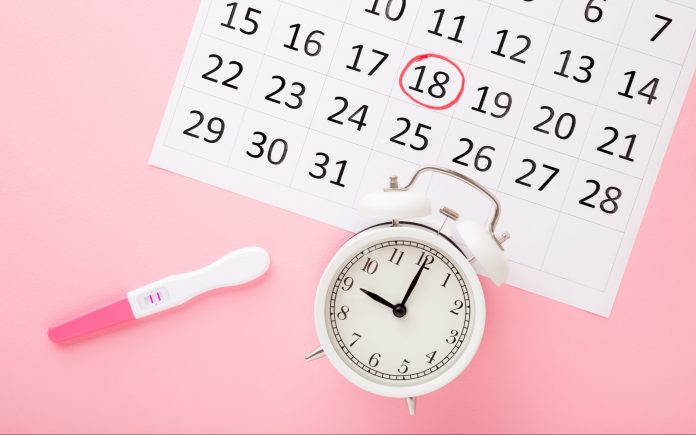
The best time to conceive is when the woman is ovulating. New and healthful eggs are released from the uterus, travel to the fallopian tubes and settle there to await fertilization. Knowing when exactly a woman is ovulating can be somewhat tricky however. This time of the month is as diverse as the weather; even a healthy female may have varying dates of childbirth and this is because there are variables that may directly affect fertility.
Time to conceive
The best time to conceive is within the midst of a female’s menstrual cycle. A typical or normal cycle is 28 to 32 days long. Thus, if you have cycles shorter than 28 or more than 32 days, and are intermittent for most months of the year, then you’ll have to consult a professional before you follow any fertility procedure.
However, all things being equal, the best time to conceive is about day 14th of this cycle. As you plan your weeks and make preparations for this day, you also will need to understand and keep in mind factors which affect a female’s fertility. It could prove futile knowing the best time to conceive without understanding and mitigating around factors that may negatively affect falling pregnant.
Health factors
- There are certain general health factors that affect fertility and these could change the perfect time to conceive. Being overweight is one of the top factors that can cause the menstrual cycle to go berserk. Fat levels over 10 to 15 percent than ordinary can make the body become overloaded with estrogens which makes your period jagged and irregular days inconsistent. Same goes for being underweight; when a man or woman is 10 to 15 percent below her ideal body weight her reproductive procedure might also be affected.
- An irregular cycle, longer than the typical 32 times or shorter during a few months, can be a certain indication of hormonal imbalances. Imbalances in hormone levels can directly affect ovulation and thus greatly affect fertility. Any hormonal imbalance must be corrected or treated prior to attempting methods to become pregnant.
- There are lots of medications that may directly affect fertility. Medications like painkillers, antibiotics and antidepressants are just a few of the drugs that could temporarily lead to infertility.
- The place where you work or remain may also affect your fertility. Exposure to substances, radiation, microwave emissions, extremes temperature and other environmental hazards can affect a woman’s ovulation and may also affect her general health also. Having private struggles, office politics and psychological stress may become potentially harmful to any individual’s psychological health, more of a woman’s.
- Alcohol may also severely affect fertility. As few as 5 drinks per week can change your menstrual cycle with a excellent possibility of decreasing your odds of conception.
- Smoking is another element that not only impairs pregnancy but also affects the whole body systems also. Someone who smokes has decreased cardiovascular and lung capacity. Smokers are more prone to develop hypertension, cardiac problems, respiratory problems, infections because of an unhealthy immune system and metabolic disorders. Stopping smoking even for only a week can massively improve your ability to conceive and potentially rejuvenate your whole body systems also.
- There are disorders that affect the woman’s hormone production that may indirectly affect her fertility. Autoimmune diseases like thyroid diseases, rheumatoid arthritis and lupus erythymatosus are a few of the most frequent examples. It’s important therefore to take care of these diseases or consult with a medical professional regarding the perfect treatment before considering the very best time to conceive.
Diseases
Aside from the most frequent health factors that influence a woman’s fertility, in addition, there are diseases of the reproductive system that may decrease a woman’s ability to conceive. It is thus suggested to seek medical assistance for any possible infertility issues. Appropriate evaluation, testing, diagnosis and therapy could be performed before planning for the best time to conceive. Here are some common ailments that a girl must be aware of:
- Endometriosis accounts for 5 to 30 percent of infertility problems in females. It’s a condition where cells from the uterine lining grow outside the uterus; it may grow anywhere near the uterus, the fallopian tubes, the intestines and even close to the bladder. Along with scar tissue formation and ovarian cysts, even if fertilization occurs, the egg won’t be able to implant on the uterus because of the many abnormalities. The cause for endometriosis is unknown but early detection can significantly increases a woman’s chances of therapy. Signs that you have endometriosis are painful menstruation, a noticeable increase in menstrual flow and painful sexual intercourse.
- Sexually transmitted diseases may also affect a woman’s fertility. It’s estimated that there are 65 million Americans are diagnosed with STD. In women, if STDs are left untreated, may result in scarring of the fallopian tubes, higher risk for ectopic pregnancy, infertility and other reproductive issues. Like other disorders, STDs are treatable and early identification increases a woman’s chances for therapy.
Men Health
Addressing a woman’s fertility issue is just half of what has to be done before the ideal time to conceive arrives. A man must decide if there are also factors that impede pregnancy coming out of his side. Here are potential fertility dangers that men often fail to notice:
- Sperm health and motility is the trick to a successful conception. This may be achieved by quitting smoking, drinking alcohol and taking illegal drugs.
- Sperm may be destroyed by heat and polluted environment. Wearing boxers is the most recommended undergarment for men to maintain sperm at the sacs of the scrotum healthy and viable. Wearing briefs can move the scrotum near the body destroying sperm through body heat.
- Stress may also affect sperm health and quantity. It’s important therefore to decrease stress through effective meditation and relaxation methods.





